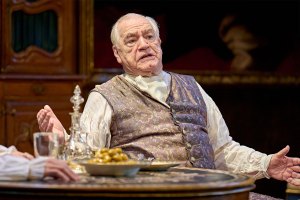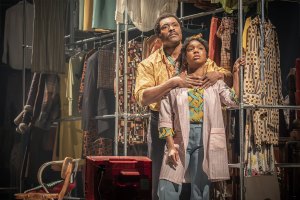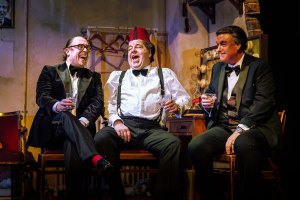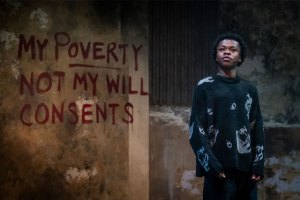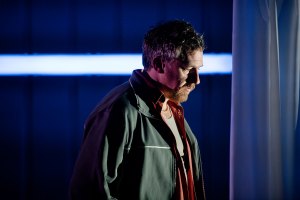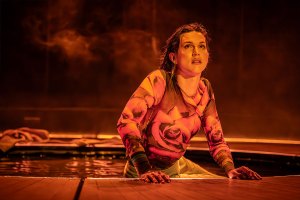Equus
Wild horses, I thought, wouldn’t drag me to Equus all over again, and I was hardly gagging to see Harry Potter star Richard Griffiths with his kit off (though I might have misconstrued the soft porn publicity on that one). As it turns out, this is a highly impressive revival of Peter Shaffer’s 1973 passion play (last seen seven years ago at the Salisbury Playhouse), with suddenly renewed homoerotic overtones, that proves an ideal stage debut for the other Harry Potter star, 17 year-old Daniel Radcliffe.
Radcliffe plays Alan Strang, a weirdly wired young man who has been referred to the psychiatrist Martin Dysart (Griffiths) after blinding six horses in a stable with a metal spike. He is tremendous – taut, composed, glinting with a kind of malicious glee and absolutely spot-on in charting a progress from childhood to the lost innocence of growing up. Shaffer first heard of the story from his friend and neighbour James Mossman, the television journalist currently celebrated in The Reporter at the National Theatre. Shaffer’s twist was to make the act of mutilation one of frustration and rejection after failing to find a satisfactory physical expression with the young stable girl, Jill (Joanna Christie), who seduces him after a night out in Winchester.
I had forgotten that, on that outing, Alan sees his father (Jonathan Cullen), a printer by trade and a repressive armchair socialist, forever railing against the evils of television, emerging from the same cinema and sex film as he and Jill. The subsequent sex scene of their own, and the final sequence of the play, leading to the mutilation, is touchingly and beautifully played by the two young actors in the buff. The tragedy, as Dysart himself realises, is that his job is to take Alan off his horse and put him on a scooter en route to “normality” in suburbia.
For the play is a metaphor of denial in our everyday life, the price we pay for being good citizens. Alan’s religion of the horse is pagan and destructive. Dysart, in a great speech superbly delivered by Griffiths, marvels at the boy’s capacity to run wild in a Hampshire field while he parcels up his enthusiasm for the classical world in Peloponnesian package tours and his collection of art books; Dysart is also enduring a dead marriage. Strang’s parents – his mother (Gabrielle Reidy) is a flaky teacher whose Bible-thumping badly backfires – are similarly emotionally hamstrung.
Thea Sharrock’s production is notably well acted, even by Jenny Agutter (who played the stable girl in Sidney Lumet’s unsatisfactory film version) in the thankless, underwritten role of the magistrate who refers Alan to Dysart. Will Kemp, one of Matthew Bourne’s leading dancers, is an elegant horseman on the beach, where the six-year-old Alan first discovers his passion, and also Nugget, the main horse in the stable. Nugget and the other five, as in the original John Dexter production, are clad in chestnut brown costumes and fitted out in wonderful skeletal horse heads and built-up metal hooves like the cothurni in Greek tragedy.
I seem to remember more “horse” action before, but it must have just been the impression they made. Napier was Dexter’s designer, and he has reproduced the bull ring effect by this time floating the onstage spectators in two wrap-around circles that complement the Gielgud’s interior architecture. Lighting maestro David Hersey provides a cloud of smoke-filled nirvana for Radcliffe’s exhilarating expeditions to the other side of unbridled adolescent expression. A marvellous evening.
– Michael Coveney


